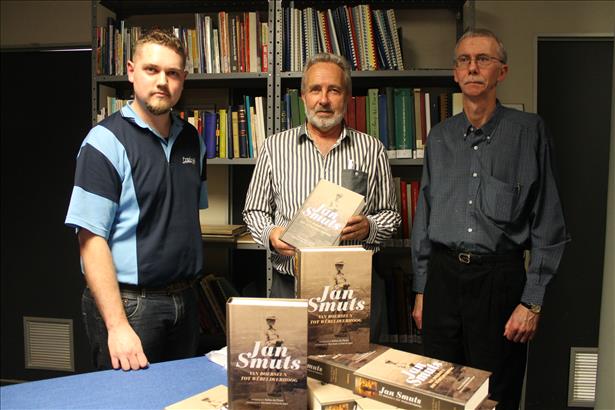Latest News Archive
Please select Category, Year, and then Month to display items
18 November 2024
|
Story Jacques Maritz
|
Photo Supplied
 Muhammad Cassim, a second-year student in the Department of Engineering Sciences in the Faculty of Natural and Agricultural Sciences.
Muhammad Cassim, a second-year student in the Department of Engineering Sciences in the Faculty of Natural and Agricultural Sciences.
Muhammad Cassim, a second-year student in the Department of Engineering Sciences in the Faculty of Natural and Agricultural Sciences at the University of the Free State, will participate in the winter university project in Pskov, Russia, from 25 November to 9 December 2024.
The winter school aims to strengthen relationships among young engineers and deepen international interaction via skills improvement, joint projects, and social cohesion. The programme boasts a densely packed education block, project block, and cultural block.
Cassim is part of the UFS Grid Related Research Group and actively participates in research centred on complexity science. He intends to complete his BSc Physics degree with Engineering subjects and progress towards postgraduate studies in the UFS Department of Physics.
He is currently working on verifying experimental developments in the field of synchronisation in complex networks. While he has already completed this high-performance computing training in his first year under the leadership of Albert van Eck (Director, UFS E-research), he is looking forward to the masterclasses in holographic modelling, deep learning, direct laser deposition, and database. Closely resembling his current research, he will have the opportunity to gain more experience in the use of set theory and graph theory in solving digital information processing problems.
For more information about international scholarships for study abroad opportunities, contact Mbali Moiketsi in the Office for International Affairs.
Cassim’s student profile is the culmination of the department’s strategy to produce young applied scientists who are subjected to the culture of research during their undergraduate study and could articulate with ease to other departments for postgraduate studies. The department aims to align with the UFS’ Vision 130 by producing competitive students who can operate in the postgraduate paradigm with the digital themes of veterinary science and ecological engineering science.
Jan Smuts: from country boy to world stage; a reassessment
2017-11-10

At the book discussion of Jan Smuts: van boerseun tot wêreldverhoog;
'n herwaardering, were from the left: Con Robinson, Protea Bookshop;
Prof Kobus du Pisani; and Prof André Wessels from the Department
of History at the UFS.
Photo: Leonie Bolleurs
Prof André Wessels from the Department of History at the University of the Free State (UFS) was one of 20 co-authors of Jan Smuts: van boerseun tot wêreldverhoog; 'n herwaardering – a book compiled under the leadership of the general editor, Prof Kobus du Pisani, from North-West University. This unique history book deals with the different themes in the life of Smuts, rather than describing the events chronologically.
South Africans are almost afraid of their own history nowadays ... and yet another history book is being launched. Does it make sense? Yes, for two reasons.
The monster in the dark
One of the ways to overcome fear is through knowledge. The monster in the dark disappears when one understands that the street lights and tree branches are creating interesting shadows. The more one knows about something, the less scary it becomes.
The Greek Bible
This was possibly also Smuts’s approach. Knowledge was his passion, and even today he is considered as one of the best students of the University of Cambridge. Although very few people really understand his holism theory, Smuts experienced the complex world in a very simple way – as one – not as lots of different pieces functioning independently of each other.
Smuts could have made a success of any of his interest fields – law, botany, literature, and philosophy. However, politics laid three wars on his doorstep. While he is regarded as a militarist by some, he was actually a peacemaker. He played a role in the establishment of the League of Nations, and later the United Nations. Incidentally, he continued to read the Greek Bible while on commando during the Anglo-Boer War.
A colourful character
The second reason for yet another Jan Smuts history book is his fascinating humanness. Time should be spent on colourful characters such as this. It is worthwhile hearing the story of someone who had such a great impact locally and internationally – good or bad.